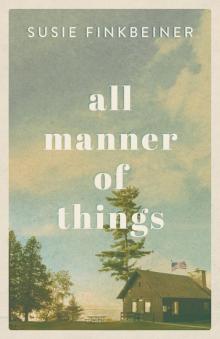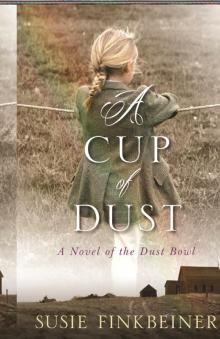- Home
- Susie Finkbeiner
All Manner of Things Page 8
All Manner of Things Read online
Page 8
“Why are you sorry?” I didn’t correct him.
“Frank. He’s gone. I’m afraid it was something I did.”
“That wasn’t your fault,” I said, looking him in the eye. “He’ll come back.”
“What if he doesn’t?” he asked.
“I don’t know.” I shook my head. “Let’s just get you inside, okay? Maybe you can have a little hot chocolate. With marshmallows too? Would you like that?”
“And a cookie?”
“Maybe.”
I put my hand on his cheek, feeling at least a few days of stubble there.
“Don’t run away again,” I said. “Please.”
“I’ll try not to.”
13
It was past two in the morning when Mom got home from Grandma and Grandpa’s house. She’d stayed behind, somehow managing to get Dr. DeVries to come check over Grandpa. He didn’t usually do house calls, but for her, he made exceptions.
An hour earlier I’d driven the station wagon home, Joel snoozing in the passenger’s seat. The good doctor had offered to drive Mom home. I thought it took some nerve, the way he looked at her in front of her husband’s parents.
She stepped in through the back door and into the kitchen, kicking off her shoes as soon as she hit the linoleum and leaving them where they landed.
“What are you still doing up?” she asked, clunking her purse on the counter.
“I wanted to wait up for you,” I answered.
“Don’t you have to work in a few hours?”
I closed the book I was reading and put it on the table. “I’ll be all right.”
“You’re still young.” She sighed. “I, on the other hand, am far from it.”
“How’s Grandpa?”
She sighed again and dragged the step stool to the refrigerator, climbing on top and opening the cupboard. She reached all the way back for a dusty old coffee can that had been shoved into the far corner.
Ever since I could remember I knew that Mom kept a pack of cigarettes in that Folger’s tin. For emergencies, she claimed, and I believed her. In all the years since Frank left, I’d only caught the smell of smoke on her breath three times.
“He’ll be all right. Dr. DeVries thought it was best to take him to the hospital for observation. Just in case.” She climbed back down and sat on the other side of the small, drop-leaf table. “He needed a few stitches in his foot. Otherwise, he’s fine.”
The pack of Lucky Strikes crinkled as she pulled them out. She took one, sticking the end between her lips and reaching into the bottom of the can for the book of matches she’d thrown in at some point. It took her more than a few attempts at lighting it before a flame burst from the end of the matchstick.
“I talked to your grandmother about what she needs to do next,” she said, getting up for a saucer to catch her ashes. “She can’t take care of him anymore.”
She narrowed her eyes as she pulled on the cigarette and let out a little puff of smoke along with a cough.
“These sure are stale,” she said, crushing the cigarette into the saucer.
“What else can she do?” I asked.
“She might have to find a place for him.” She shook her head. “It’s not safe for him there anymore. He’s so big. I don’t know how she’s been getting him around that house. He needs her to help him get to the bathroom. Sometimes he doesn’t make it.”
Crossing my arms, I leaned back in my chair, letting my shoulder blades push into the hard wood. It made me feel sick to my stomach just thinking about it.
“She doesn’t need to be cleaning him up like that,” Mom said.
“We can take turns helping her,” I said. “I can make supper for them.”
“He needs to be in a nursing home. I told your grandmother that, but I don’t think she likes the idea too much.” She got up and emptied the ashes and hardly smoked cigarette into the trash can. “I shouldn’t have to make these decisions.”
She didn’t have to say anything for me to know that she meant that Frank should be the one to take care of his own parents. Frank and his sister, Rose.
“Should we get ahold of him?” I asked.
“Who?”
“Frank.” I sat up straighter. “He should know about this.”
“I wouldn’t even know where to start looking for him.” She drummed her fingertips on the countertop. “He could be in Siberia for all I know. All I care.”
My knee bobbed up and down, my bare heel tapping the floor. Swallowing hard, I looked up to meet my mother’s eyes.
“What?” she asked.
“What if there was a way to find him?”
“Does your grandmother know where he is? Did you talk to her about him?”
“No.” I swallowed, regretting even bringing it up. I’d made a promise to Mike.
“Maybe I’ll ask her.”
“Did anyone call Aunt Rose?” I asked, hoping to change the subject.
Mom rolled her eyes. “I did. She said she can’t come until tomorrow evening.”
It was no surprise to me that Aunt Rose didn’t get into her Lincoln or Cadillac or whatever rich women drove and come over from her enormous house in Grand Rapids to help Grandma when she was most needed.
I swallowed back the bitterness and wondered what my grandparents had done to deserve two ungrateful children.
“I’m sure your grandmother will get ahold of Frank eventually.” She took another cigarette from the pack, holding it between her fingers, unlit. “If she even knows where he is.”
“Are you upset?”
“About what?”
“I don’t know. Just that I brought up Frank?”
She shook her head. “No. Honey, he’s your father. No matter what he’s done. Or not done.”
“Do you think he’ll ever come back?” As many times as that question had been on the tip of my tongue, I’d never asked it out loud before. “What would happen if he did?”
“I’ve asked myself that same thing for twelve years.” She dropped the unlit cigarette into the can with the rest of the pack and stood, carrying it back to her hiding spot. “He wouldn’t come here, you know. This has never been his house. He isn’t welcome.”
“Are you mad at him?”
She shrugged and wiped under her nose. “Not anymore, I don’t think. I haven’t had much time to be angry.”
“You could be.”
“But what good would that do me?” She padded her way to the door that led in the direction of her bedroom. “I can’t let something that happened twelve years ago unravel all I have to hold together today. Wait to talk to your grandmother about this until Monday, all right?”
I nodded.
“With your aunt Rose on her way here, she’ll have plenty to handle.”
She told me good night and went to her room.
After flipping the kitchen light off, I took the stairs to my room. Checking the clock, I saw that I needed to be up for work in three hours. I couldn’t decide if it would be better to sleep that little or just stay up.
The way my mind was spinning, I didn’t think I’d be able to sleep even if I tried.
Instead of lying down, I grabbed one of the books Frank had left behind, a survivor of the purge Mom had done twelve years before. Between the pages was the postcard he’d sent us just after he’d gone. I touched the letters as if I might be able to feel them carved into the paper.
I didn’t feel anything, so I shut the book and put it back on the shelf where it could stay and collect dust for all I cared.
I lay awake in my bed until my alarm went off.
14
For several years after Frank left, Grandpa would stop by our house on a Saturday morning for a cup of coffee with Mom. He’d play catch with Mike in the backyard and let Joel sit on his lap, reading to him from a book he’d brought from home. He would meet me at the kitchen table, drinking water from my miniature-sized tea set, always sticking his pinky finger up in the air.
Before he’d
leave, he’d hand something to Mom, which she’d always try to refuse. It wasn’t until later that I realized it was money to put toward the mortgage or to buy a week’s worth of groceries. When I’d asked him about it, he’d made me promise to keep it a secret from Grandma.
“She wouldn’t understand,” he’d said.
He came less frequently as we got older and Mom’s job started paying better. But, still, when he came, he’d hand her a little money.
“Let me help,” he’d say. “Please.”
It wasn’t until the day when he’d gone to the old house, the one that backed up to the lake, insisting on visiting his grandchildren, that we knew something had gone wrong with him.
That was when Grandma took his car keys, insisting that he go nowhere without her.
After that he’d slipped quickly, his mind dropping some memories and holding dearly to others. His hair thinned, and his body too. And nearly all the time he had a look of fear and detachment behind his eyes.
But that fear was gone, dissolved, when we went to see him in the hospital.
It was a Tuesday and I’d taken Joel along with me. Mom had given us a few dollars to pick up a bouquet for his room. Not as much for him as for Grandma.
Grandpa lay in his bed, his head resting on his pillow, his hair sticking up and dull looking as if it could use a good wash. The room held the smell of medicine and antiseptic. Sterile yet sick.
In a chair pulled up to the bed, Grandma sat, a magazine on her lap but her eyes fixed on the wall over Grandpa’s bed. She looked so small and frail, as if she’d shrunk in the few days since I’d last seen her. I feared if she stood that she’d crumble.
“Grandma,” I whispered, not wanting to break the silence and frighten her. “Hi.”
“Oh, kids,” she said. “Come in. Rose, do you see who came?”
Aunt Rose was sitting, straight as a pin, to Grandpa’s right-hand side. When she saw us, she jolted up, letting go of his hand and coming around the end of the bed.
“Look at you two,” she said, extending her arms toward us. Giving us each a stiff hug, she pecked our cheeks with no softness of lips. “I’m glad you came.”
“How was your drive over?” Joel asked, rubbing at the spot where she’d hit him with her lips.
“Oh, you know. Traffic was miserable.” She used a hand to fluff the bottom of her dark hair. “But you didn’t come to hear about my trip. Dad, did you see who’s visiting?”
“Who’s that?” he asked.
“Francis’s kids,” she yelled. “Well, two of them at least.”
Joel and I stepped forward when Aunt Rose pulled at our arms. Grandpa looked from Joel to me and back again. He smiled, his eyes watery.
“Well, hello,” he said, his voice thick and gravelly. “I don’t remember you, but I’m glad you’re here.”
“Hi, Grandpa,” Joel said, moving to the bedside and taking his hand. “How are you feeling?”
“Not good. Not good.” Grandpa looked up into Joel’s face. “My, do you look like Frank. Is this him?”
“No, honey,” Grandma answered. “This is Joel. Frank’s son.”
“He looks like him, doesn’t he?” Then he looked at me. “And you, who are you?”
“Annie,” I answered.
“Come sit by me, Annie.” He patted the edge of his bed, where my aunt had been.
“Frank wrote me,” he said.
“Rockston,” Grandma said.
“He sends me a letter every week,” Grandpa went on.
“Now, he does not,” she said. “You’ll just upset the children, saying things like that.”
I met eyes with her. She didn’t hold mine longer than a moment.
“Can you read?” Grandpa asked Joel.
“Yes, sir.”
“Good for you.” He smiled and clapped his hands together. “Will you read me a story?”
Joel moved to sit on the other side of Grandpa’s bed, reading to him from a Time magazine Grandma had on the bedside table. When he’d finished one article, Grandpa asked for another. He beamed at Joel the whole time.
It wasn’t long, though, before he was tired and wanted to sleep. Joel gave him a hug, and Grandpa patted his cheek.
“You’ll be a good boy, won’t you?” Grandpa asked.
Joel nodded, saying he would try.
Then I went to hug him. Grandpa turned his face, planting five kisses on my cheek. Then he put his hands on my shoulders, pushing me away so he could look into my eyes.
“Do you know why I kissed you five times?” he asked.
“Why?”
“Because I forgot how to count.”
Even though tears prickled in the corners of my eyes, I couldn’t help but smile.
“I love you, Grandpa,” I said.
“I love you, Annie.”
“You remembered my name.”
“And I remembered to love you.”
Joel and I left the hospital, the corridor seeming so long as we walked toward the exit.
For the rest of that day, I felt the prickle of his stubble on my cheek.
Fort Knox, Kentucky
Dear All,
Sorry to hear about Grandpa. I wish I could be there to help out. I bet he’s madder than a wasp about having to stay at the hospital. How’s Grandma managing? I wrote to her, but she didn’t write back. I know she probably doesn’t have time right now.
I asked the chaplain here to pray for Grandpa. He said he would. He seems like a real nice guy. You’ll be glad to know that I haven’t missed church on a Sunday. He’s an okay preacher. Nothing like home, but that’s all right. I guess they have church over in Nam too. I know Oma will be happy about that. You too, Mom, I’m sure.
I’ve got some good news and bad news. I’ll start with the good. Uncle Sam decided that he does, indeed, need me as a medic. The bad? He tagged eight more weeks on to my training. After basic is done, I’ll be hopping on a plane to Texas to learn how to save lives.
Joel, I know you were hoping I’d be back in time for your birthday. But, I’m sorry that I’ve got to miss this one, pal. Fourteen is a big one, isn’t it? Tell you what. My gift to you is letting you drive the Corvair around the cemetery a few times. That way you won’t be able to kill anybody. Make sure somebody takes a picture of you behind the wheel. I’ll bet you’ll look plenty tough driving it.
I gotta run. A few fellas are putting together a touch football game here after chow. See, they aren’t running us too hard.
I miss you. Joel, you too.
Mike
15
Detroit was on fire. Just one more race riot for the summer. Buffalo, Newark, Minneapolis. And then Detroit. Even in the black and white of our television screen, I could see the hot flames licking up the sides of buildings and houses. Plumes of smoke filled the sky like clouds. Police wearing helmets and carrying shields marched through the streets while black residents ran or fought back.
We watched all evening, Mom shaking her head most of the time. Joel fell asleep on the sofa about eleven. I sat on the floor, legs bent and knees tucked up under my chin. It was near midnight when a gray bar spanned across the screen followed by the face of the president.
Johnson called the riots “extreme disorder in Detroit, Michigan.” From what I saw, I would have thought the words “war zone” were more apt.
A war zone less than a three-hours’ drive from our front door. It simply did not seem possible.
“No one is going to win this,” Mom said, standing to turn the television off.
She looked at Joel and smiled. He looked snug as a bug. Since he was a baby, he could always sleep anywhere, a skill I had never learned.
“We can let him sleep there tonight,” she said. “I’d hate to wake him.”
On that Thursday afternoon, the rain came in lazy showers, and a pair of retired local men drank coffee and grumbled amongst themselves about the weather being no good for fishing. They’d not ordered food but asked for endless warm-ups on their co
ffee. Bernie rolled his eyes and shook his head.
“They’re going to bankrupt me,” he muttered.
I offered to water down the coffee. To that he’d made a hissing sound. But the corner of his mouth had twitched and I knew he was trying not to laugh.
David came in, as always, for a late lunch, sitting in the booth closest to the coffeemaker like he did every time he came. While he waited for me he read one of the papers that Bernie set out for customers. He had it opened to the comics.
“My favorite is Charlie Brown,” I said, pulling the order pad out of my apron pocket.
“I’m a sucker for Marmaduke,” he said, smiling up at me. “I had a big dog like him when I was a kid.”
“I would have figured you for a Batman reader.”
“He’s all right.” He folded the paper. “But he never made me laugh. Now, Marmaduke. That dog gets me every time.”
“What was your dog’s name?”
“Baby,” he answered. “My little sister named him.”
“I like that name.”
“That’s because you didn’t have to chase him whenever he ran away,” he said. “Come back, Baby! Be a good boy, Baby.”
I smiled, imagining it. “What can I get you?”
“The special is fine, please,” he answered. “And a glass of milk?”
“Sure,” I said, leaving him to his comics to put his order in.
While I waited for Bernie to serve up his plate of baked chicken and mashed potatoes with a side of green beans, I gave the table of men their bills, collecting their empty coffee cups. They grumbled their thanks before going on in their conversation.
“You hear about these riots over in Detroit?” one of the men said. “You hear about them?”
“Sure I did. Couldn’t hardly not,” the other said. “It’s all they wanna talk about on the news.”
“Awful mess, don’t you think?”
“Can’t even imagine.”
“What do you think they’re trying to accomplish? We already got one war on our hands. All these riots. They trying to start a second Civil War?”

 All Manner of Things
All Manner of Things The Nature of Small Birds
The Nature of Small Birds Paint Chips
Paint Chips My Mother's Chamomile
My Mother's Chamomile A Cup of Dust
A Cup of Dust